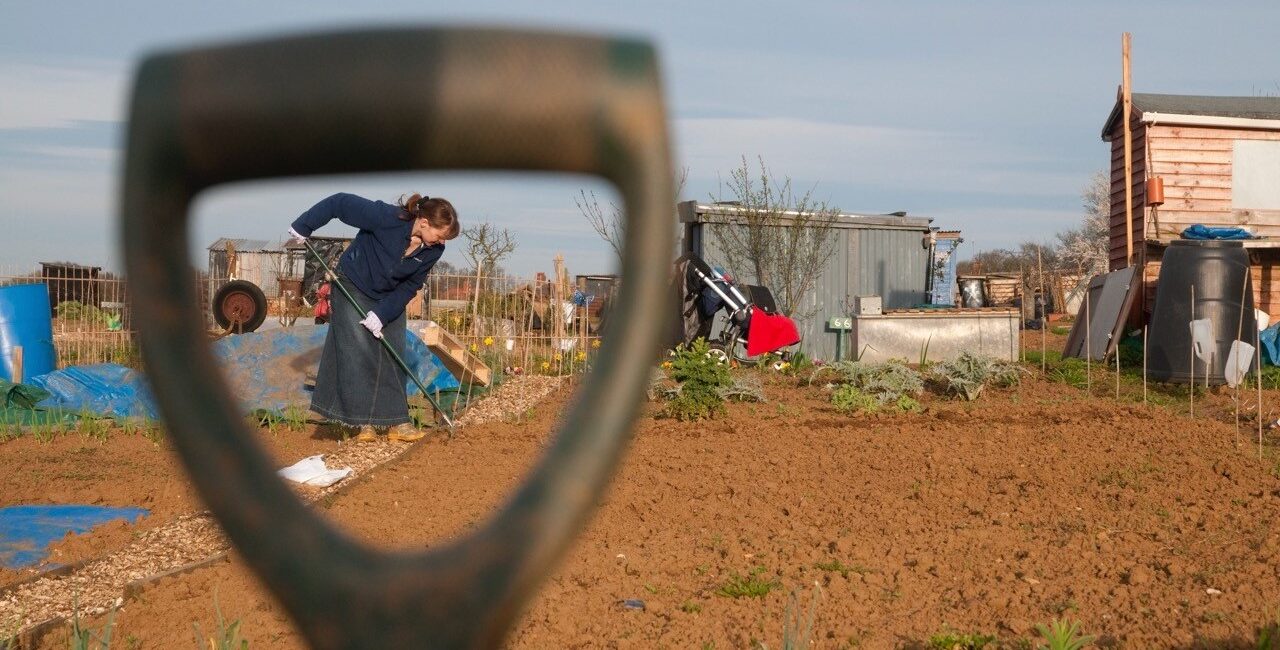By Alice Whitehead
The gate to my allotment plot is just a short walk from the doctor’s surgery. Five years ago, after weekly counselling sessions for post-natal depression, I would unlock that gate and set aside an hour to hoe. Looking back, it was here that the real therapy began.
When society tells you there should be an immediate bond with your baby, it’s hard to admit there isn’t one. For me, there wasn’t that chocolate box moment at birth where my son looked into my eyes and I into his, and love bloomed. For me, these feelings came much later.
It was a week before the due date that the pregnancy began to go pear shaped. Experiencing abnormal bleeding and strong but intermittent contractions, after repeated hospital tests and overnight stays, I was sent home with no clearer idea of what was wrong. At home the contractions became so strong I could neither eat nor sleep and on day six, I couldn’t feel the baby kicking anymore.
As the lights went out, my brain switched off too. Part of it didn’t fully wake up.
Admitted to hospital, the last thing I remember is a red button behind my head being pressed and someone shouting “the baby has no heartbeat, we need a Crash C’’ as I watched the fluorescent lights of the corridor ceiling flicker past towards the operating theatre. When the anesthetists placed the mask over my face, I felt like I was suffocating – and as the lights went out, my brain switched off too. Part of it didn’t fully wake up.
The first two weeks post-labour were relatively normally, but when everyone left and my husband returned to work, something didn’t feel quite right. The ‘not rightness’ was compounded by a post-operative infection in my scar that required daily dressings. I couldn’t walk and felt spaced out on painkillers. By this stage, I hadn’t slept properly for two weeks.
My son seemed to require hourly feeds (later I learned one of the effects of postnatal depression can be watery breast milk, which doesn’t satisfy the baby) – and on top of this, I was experiencing horrible nightmares: one where a nurse was sitting on my chest trying to give me CPR.
Slowly, conversations became difficult, I couldn’t follow TV plot lines, and simple tasks like teeth brushing, dressing or making a cup of tea seemed insurmountable. It’s easy to think depressed people cry all the time, but I didn’t feel sad: I just felt ‘mad’. If I did cry, it was out of utter despair at what seemed an impenetrable fog in my brain.
If I did cry, it was out of utter despair at what seemed an impenetrable fog in my brain.
Eventually, after talking to my health visitor about ending it all, I was referred to a psychiatrist and diagnosed with postnatal depression, triggered by chronic sleep deprivation. Later, further counselling revealed I had suffered post-traumatic stress due to the way the emergency c-section had unfolded.
The diagnosis was helpful, and I’m eternally grateful to the health visitor and counsellors for their support, but, as anyone who has suffered mental illness will know, the journey to healing is a much longer one. Over the last five years, it is gardening that has helped me recover fully.
The repetitive action of hoeing and weeding at the allotment might appear mindless, but it’s actually mindful. It has become my outdoor meditation.
At first the plot was unruly and wild: a wilderness to battle, but week by week I began to see that I didn’t need to tame the whole plot, just focus on one small patch at a time. Weed out the worries under my nose and not give too much attention to ones that would or could grow later. Grow in the present.
Week by week I began to see that I didn’t need to tame the whole plot, just focus on one small patch at a time. Weed out the worries under my nose and not give too much attention to ones that would or could grow later. Grow in the present.
Helping something else flourish brought me enormous positivity, and, of course, digging helped me vent on the bad days! Early on, I’d sit in the shed and cry when I couldn’t remember how to sow something I’d sowed last week, and railed at plants failing to germinate, but the smell of the soil, the breeze on my face, that connection with living things slowly gave me back my foundations. Mindfulness mediation often talks about feeling grounded, and gardening brought me back down to earth.
I remember during early counselling sessions I was asked to “think of my safe place” – and for me that place has always remained among the rows of vegetables, in that secluded gap between the fruit bushes, and beside the waving fronds of wild flowers at my plot.
For more information on perinatal mental health problems, check out our research and the Maternal Mental Health Alliance. If you need support, our list of contacts may be able to help.
This blog is part of our ‘1,000 conversations’ series.
To learn more about Alice, check out her website.


